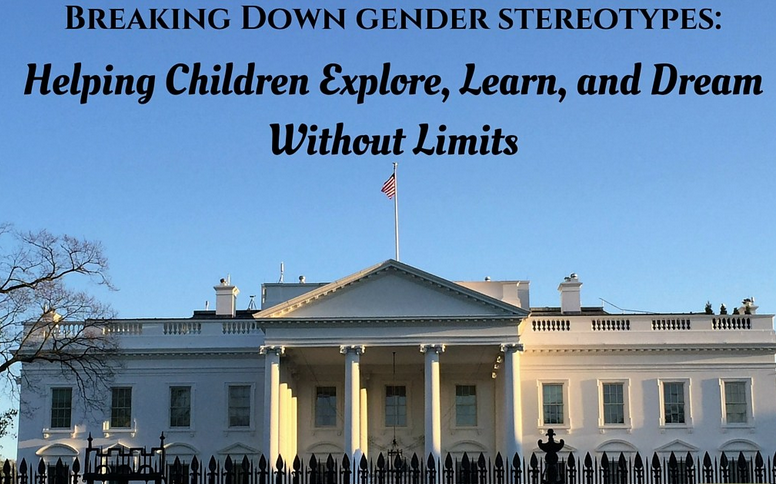 April 20, 2016 As a staunch critic of the toy industry’s complicity in marketing vapid values and gender stereotypes that can limit instead of expand kid’s brain plasticity, it’s no surprise that I raised eyebrows with newfound HOPE seeing that the White House convened a one-day session on “Breaking Down Gender Stereotypes in Media and Toys” blending a wide array of stakeholders from research academics and parenting platforms to media producers and toy industry pros. (Opening visual by Carter Gaddis of Dads4Change; don’t miss his recap from a father’s perspective)
April 20, 2016 As a staunch critic of the toy industry’s complicity in marketing vapid values and gender stereotypes that can limit instead of expand kid’s brain plasticity, it’s no surprise that I raised eyebrows with newfound HOPE seeing that the White House convened a one-day session on “Breaking Down Gender Stereotypes in Media and Toys” blending a wide array of stakeholders from research academics and parenting platforms to media producers and toy industry pros. (Opening visual by Carter Gaddis of Dads4Change; don’t miss his recap from a father’s perspective)
Having covered media and marketing’s impact on kids for a decade now on Shaping Youth, my media literacy radar was honking loudly, with “Who is Behind This?” discernment.
Was it an economically driven STEM and “fem” focus to close the gender gap with a realization we’ve essentially brainwashed girls into choosing “other” career pathways? Was it a contrarian lens on STEM?
An entertainment industry branding effort to trot out newly minted progress in the toy aisle with fresh new feedback on corporate responsibility? A research-laden effort on the impact of gender bias, social emotional learning, and child development?
When you’ve been writing about these topics as long as I have, “Who is behind this” casts a narrowcast net of big fish in the sea…
My thoughts immediately turned to Jess Weiner, as she has the connections and the clout in the girls’ sphere of cultural representation with the ear of Hollywood branding bigwigs.
As a well-connected confidence Queen, she’s uniquely qualified to convene a cross-pollination of worker bees and hive leaders ready to build on ideas, nudge them forward and use her media maven skills to actually DO something about it. She’s a USC Fresh off her involvement with the Barbie body image media blitz, it seemed to have her digital fingerprints all over it.
Sure enough, the convening was hosted by esteemed co-collaborators Jess Weiner and Sarah Hurwitz (Special Assistant to the President, Senior Policy and Strategy Advisor to the White House Council on Women and Girls, and Senior Presidential Speechwriter).
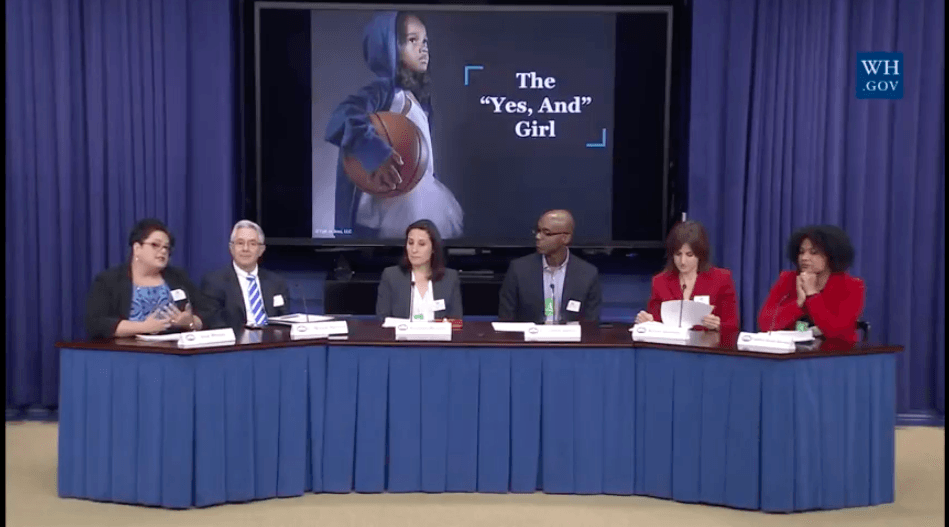 Here’s Jess Weiner’s recap of the event. Based on the interviews I’m compiling, the outcomes are layering into an “all of the above” mosh of event descriptors, marking the beginning of an important, long overdue conversation that segues from “awareness-raising” to action.
Here’s Jess Weiner’s recap of the event. Based on the interviews I’m compiling, the outcomes are layering into an “all of the above” mosh of event descriptors, marking the beginning of an important, long overdue conversation that segues from “awareness-raising” to action.
My own flag flies under the “accountability” camp, taking awareness and action one step further to lean hard on the powers that be to place public health over profit and urge corporate responsibility to first and foremost ‘do no harm’ to kids.
With a keen eye on lip-service, critical thinking, and media literacy of vested interests, I am ultimately a realist, and feel this event deserves COLOSSAL kudos for uncorking this larger conversation of “yes, and” thinking to boost it into the prominence and position it rightfully deserves via White House convening.
Is Industry Starting to “Get It” That We Reap What We Sow?
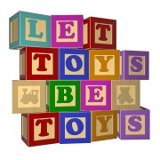 Last April in a presentation I gave in San Francisco, I wildly applauded industry’s incremental change and created these two quick videos celebrating the importance of why we not only need to “Let Toys Be Toys” but need to globally call all hands on deck as well as financially support businesses dedicating themselves to making this market correction happen!
Last April in a presentation I gave in San Francisco, I wildly applauded industry’s incremental change and created these two quick videos celebrating the importance of why we not only need to “Let Toys Be Toys” but need to globally call all hands on deck as well as financially support businesses dedicating themselves to making this market correction happen!
Fast forward to 2016, fresh from ‘toy stories’ of developers designing diversity into apps, body image making covers of mainstream media along with coding, STEM, the maker movement and discovery surging into a stronghold of positive progress.
With Great Power Comes Great Responsibility
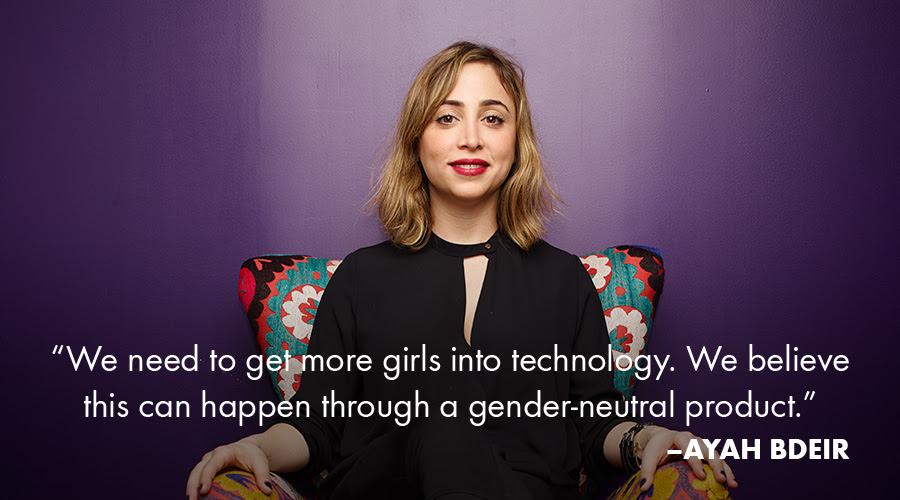 Little Bits CEO Ayah Bdeir and indie toy makers like I Am Elemental and Roominate shared their focus on STEM toys in the indie sphere, while multinational giants like Mattel and Lego shared the stage with media companies making vows toward improved outcomes and measures. It’s as if a spark ignited into full flame with research validation fueling the need to snuff out stale stereotypes with lame excuses in the name of ‘what sells’ and recognize that we have a choice as to what we consume, commodify, create and contrive in the marketplace.
Little Bits CEO Ayah Bdeir and indie toy makers like I Am Elemental and Roominate shared their focus on STEM toys in the indie sphere, while multinational giants like Mattel and Lego shared the stage with media companies making vows toward improved outcomes and measures. It’s as if a spark ignited into full flame with research validation fueling the need to snuff out stale stereotypes with lame excuses in the name of ‘what sells’ and recognize that we have a choice as to what we consume, commodify, create and contrive in the marketplace.
Manufacturers can choose to produce media and marketing that innovates and educates or depletes and degrades…That builds our social fabric or tears it down with sexism triggering negative social emotional cues and reductive empathy.
Parents and youth can use their purchase power to pushback on retail sexualization, demand healthier product offerings, and raise voices to retire stereotypes that reinforce damaging, stagnant gender tropes that limit children’s self-concept.
“With great power comes great responsibility,” and one can hope 2016 will mark a shift toward positive play patterns with kids discovering side by side in a “collaboratory” of collective knowledge instead of segregated in walled worlds and gender silos that needlessly box kids into limited scope and vision.
Why Squashing Stereotypes Helps Girls AND Boys
Sociologist, researcher and White House panelist Dr. Elizabeth Sweet’s poignant Atlantic piece about gender demarcations being more divided NOW than they were 50 years ago is a clarion call for profound reflection.
This is More Than an ‘OOPS!’ Moment, People.
It’s a “What have we done, and how can we fix it?” realization that has economic, public health, and neuroscience implications, ranging from body image, consent, self-worth and children’s wellness to brain plasticity and behavioral health.
The White House convening of panelists and stakeholders to take action to upend gender stereotypes is a start, now let’s “Talk to Jess” and hear more about her voice and vision to grow this convening into sustainable change.
Personally, I’m hoping this is the start of industry taking responsibility for what it puts out there as we ‘get back to where we once belonged’ and actually SEE higher quality offerings and outcomes from Hollywood to the toy aisles.
This is Part One in a series of interviews covering panelists and attendees at the White House convening, with an open call to any and all to weigh in on ‘best practices.’ Interviews with Dr. Elizabeth Sweet, author Rosalind Wiseman (Creating Cultures of Dignity) and other noteworthy voices to come.
In Conversation With Jess Weiner
Co-Host of White House Convening:
Breaking Down Gender Stereotypes in Media & Toys
Amy Jussel, Shaping Youth: Hot off the branding overhaul of Barbie, girls as superheroes traction, and confidence credos for empowering girls, were you tapped by the WH to lead this convening , or did you propose this concept on your own?
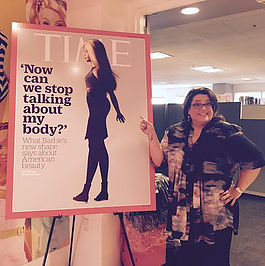 Jess Weiner, Talk to Jess: Yes. I’ve been fortunate to work on a few events for the White House Council for Women and Girls over the years and we’ve spoken a bit about what it would take to convene a summit with a variety of stakeholders in the toys and media space. We felt it would be important to not only bring together the country’s best researchers but the industry leaders who call the shots and ultimately the parents and educators who have immense influence on buying decisions and are importantly on raising our children.
Jess Weiner, Talk to Jess: Yes. I’ve been fortunate to work on a few events for the White House Council for Women and Girls over the years and we’ve spoken a bit about what it would take to convene a summit with a variety of stakeholders in the toys and media space. We felt it would be important to not only bring together the country’s best researchers but the industry leaders who call the shots and ultimately the parents and educators who have immense influence on buying decisions and are importantly on raising our children.
What was unique about this convening though was that we were also looking at the position gender stereotypes put us in as a workforce. With over half a million unfilled STEM jobs in this country, if we don’t begin to counter the bias that girls face going into this sector, we lose out on a workforce. And the same for teaching or nursing with boys. If they are hampered by an idea that they can’t be nurturing they may avoid those job sectors as well.
Amy Jussel: What was your over-arching goal and which specific outcomes and sustainable initiatives took hold? What other ideas surfaced to reinforce and even INCENTIVIZE corporate social responsibility toward a healthier worldview for kids?
Jess Weiner: The businesses who participated in this summit are the leaders in their industry – they have already identified that this is an issue to be challenged and are working to innovate it in their own way, in their own work specific portals. But one thing my work behind the scenes with companies have showed me is that the story of what they are doing or how they are doing it is often never told in a way that consumers have access to. So this was also a chance to have them share very openly I might add about the work they are doing and the challenges (and successes) they are having along the way.
Amy Jussel: Name three ‘surprise’ outcomes that made your heart sing.
Jess Weiner: The one call to action that truly lit me up was when our research panels called for a “Reimagining of Boyhood”. The research presented really illustrated that the concept of modern boyhood is not serving our boys, it is harming their emotional and social well being, and it is perpetuating a cycle of stereotyping that is hard to come back from. It was so compelling and important for the room to hear about the inner lives of boys and how they are impacted by gender stereotypes. After working in the girls space for over 20 years, I know that we can’t achieve the parity we seek w/o engaging our knowledge and connection with boys differently.
Amy Jussel: Do you feel consumer demand is fueling this shift in content, or is it catching hold because it’s finally being PROVEN to “sell?”
Jess Weiner: Consumer and parent voices are certainly at the forefront of this conversation and are driving incredible change. But we can’t underestimate the innovators in industry as well – there are many executives working within their positions of power who want to do better, who are parents themselves and want to challenge the system of play and marketing that has been created. It is a wild eco system we have to address – it’s everything you mention – retail relationship, relationship with licensees, consumer demand (because ultimately it always comes down to bottom line and profit) and while our dissenting voices may be loud – the wallet is louder.
Amy Jussel: Tell me about USC Annenberg Communications and the partnerships that came out of this White House event to raise the bar for kids (and humanity!)
 Jess Weiner: We couldn’t have done this event without the wonderful leadership from my colleagues at USC – specifically Dr. Stacy Smith and her team at the Media, Diversity, and Social Change Initiative. Stacy has been creating the leading research in the area of inclusivity and diversity in Hollywood media, looking specifically at everything from who is in front of and behind camera to who is in the C suite at the studios and networks.
Jess Weiner: We couldn’t have done this event without the wonderful leadership from my colleagues at USC – specifically Dr. Stacy Smith and her team at the Media, Diversity, and Social Change Initiative. Stacy has been creating the leading research in the area of inclusivity and diversity in Hollywood media, looking specifically at everything from who is in front of and behind camera to who is in the C suite at the studios and networks.
She is dismantling the illusion of power with her research and it is helping to incentivize and hold accountable the systems in Hollywood that continue to turn out the same formulaic messaging. So it felt like a natural that the MDSC Initiative should lead this conversation and I’m proud to be an affiliated faculty member there. We are hoping that USC can take this initiative on next year – regardless of who is in the White House – and continue to bring together various voices in this space to work on change.
We know this convening was a beginning moment for many, an important momentum for some and the public platform that we all needed to recognize that gender stereotypes not only will eventually be bad for business but they are bad for the future of our economy, jobs, and well being of children most of all.
Agenda Courtesy of CEO Jodi Norgaard of GoGoSports Girls (SY interview forthcoming)
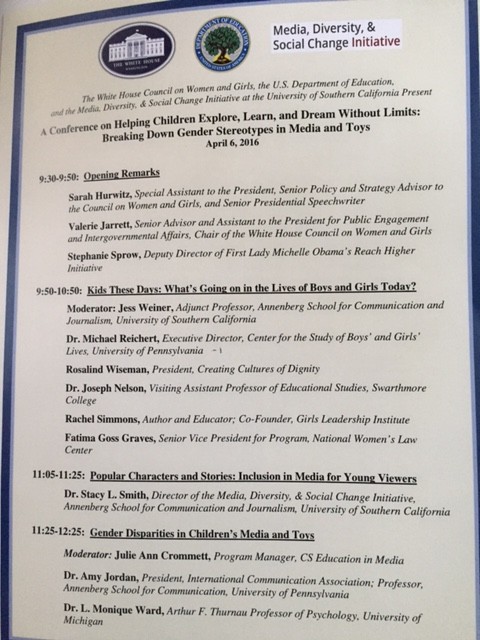
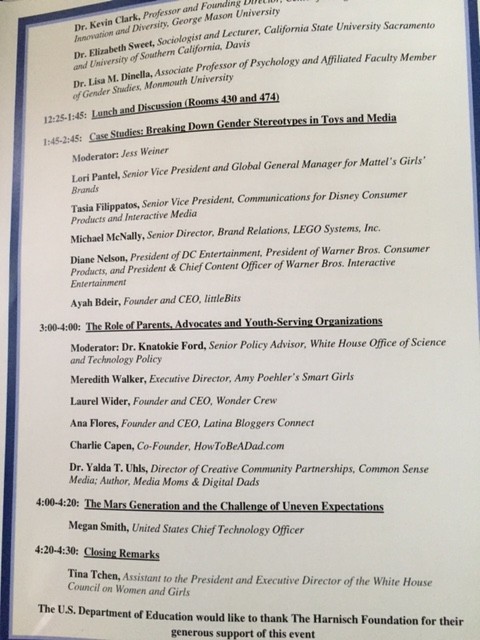









Speak Your Mind